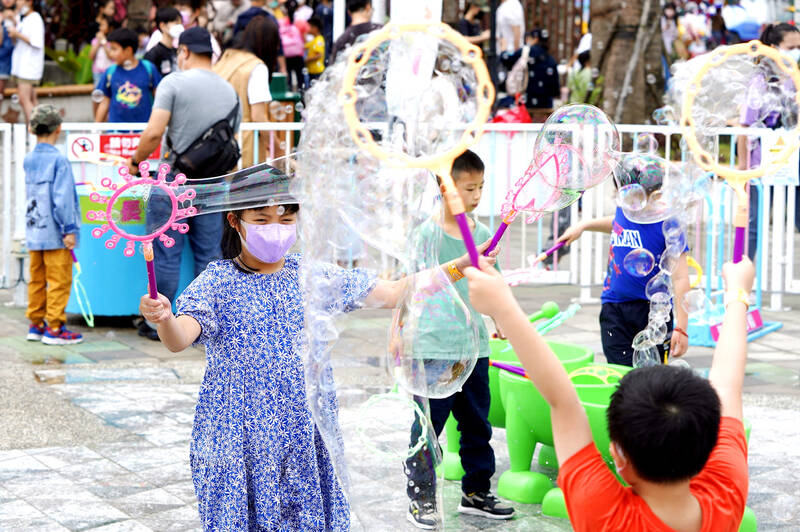Academic stress, loneliness, and a lack of sleep and exercise have been identified as the main reasons for unhappiness in Taiwanese children, a survey conducted by the Child Welfare League Foundation showed yesterday.
The foundation released the results of its annual survey on Children’s Day yesterday.
The survey of nearly 2,000 fifth to ninth-graders nationwide found that their average satisfaction score was 73.1 out of 100, meaning that they achieved a “medium level” of happiness, the foundation said.

Photo: CNA
About 79 percent of respondents gave their life satisfaction score a passing grade of 60 points, half a percentage point lower than last year and 8.9 percentage points lower than the average score in the WHO Health Behavior in School-Aged Children study, it said.
Nearly 45 percent of respondents reported that they experienced academic stress, 2.9 percentage points higher than last year and 9.5 percentage points higher than the WHO study average, the foundation said.
The result further explained why 28.8 percent of respondents told interviewers that they do not like school and only 14.4 percent said that they like school, the foundation said.
The percentage of students who reported that they like school was nearly 14 percentage points lower than the WHO study average, it said.
“Although schools began to adopt new curriculum guidelines in 2021, students’ academic stress shows no sign of easing,” the foundation said.
However, more than 70 percent of respondents reported feeling safe on campus, and that other students are friendly and willing to help, it said.
The survey also found that 26.3 percent of respondents exercise for more than 60 minutes less than two days per week.
The average sleeping time for respondents was 7.62 hours per day, lower than the eight to 10 hours recommended by international studies, the foundation said.
That the COVID-19 pandemic deprived many of the opportunity for in-person interactions over the past three years appears to have taken a toll on the mental health of students as well, with 15 percent of respondents saying that they felt lonely, it said.
About 28 percent said that they felt the world could go on without them, while only 27.9 percent said that they like the life they have now, it said.
Meanwhile, 46.2 percent of respondents told interviewers that they eat with their family every day, which was close to the WHO study average of 50 percent.
Nearly 62 percent said that telling their personal problems to their mothers was easy, up from 56.6 percent last year, while nearly 49.5 percent said telling their problems to their fathers was easy, up from 45.2 percent last year, the foundation said.
The pandemic appears to have facilitated communication between children and their parents in some families, it said.
“Children and parents face new problems and challenges in the post-pandemic era,” foundation executive director Pai Li-fang (白麗芳) said. “Everyone has to rethink the type of lifestyle we want to pursue to make our children happier.”
The survey, which was conducted from Dec. 9 last year to Jan. 13, collected 1,875 valid samples from students aged 11 to 15 nationwide and it had a margin of error of 2.26 percentage points.

The German city of Hamburg on Oct. 14 named a bridge “Kaohsiung-Brucke” after the Taiwanese city of Kaohsiung. The footbridge, formerly known as F566, is to the east of the Speicherstadt, the world’s largest warehouse district, and connects the Dar-es-Salaam-Platz to the Brooktorpromenade near the Port of Hamburg on the Elbe River. Timo Fischer, a Free Democratic Party member of the Hamburg-Mitte District Assembly, in May last year proposed the name change with support from members of the Social Democratic Party and the Christian Democratic Union. Kaohsiung and Hamburg in 1999 inked a sister city agreement, but despite more than a quarter-century of

Taiwanese officials are courting podcasters and influencers aligned with US President Donald Trump as they grow more worried the US leader could undermine Taiwanese interests in talks with China, people familiar with the matter said. Trump has said Taiwan would likely be on the agenda when he is expected to meet Chinese President Xi Jinping (習近平) next week in a bid to resolve persistent trade tensions. China has asked the White House to officially declare it “opposes” Taiwanese independence, Bloomberg reported last month, a concession that would mark a major diplomatic win for Beijing. President William Lai (賴清德) and his top officials

The Ministry of Foreign Affairs (MOFA) yesterday expressed “grave concerns” after Singaporean Prime Minister Lawrence Wong (黃循財) reiterated the city-state’s opposition to “Taiwanese independence” during a meeting with Chinese Premier Li Qiang (李強). In Singapore on Saturday, Wong and Li discussed cross-strait developments, the Singaporean Ministry of Foreign Affairs said in a statement. “Prime Minister Wong reiterated that Singapore has a clear and consistent ‘one China’ policy and is opposed to Taiwan independence,” it said. MOFA responded that it is an objective fact and a common understanding shared by many that the Republic of China (ROC) is an independent, sovereign nation, with world-leading

‘ONE CHINA’: A statement that Berlin decides its own China policy did not seem to sit well with Beijing, which offered only one meeting with the German official German Minister for Foreign Affairs Johann Wadephul’s trip to China has been canceled, a spokesperson for his ministry said yesterday, amid rising tensions between the two nations, including over Taiwan. Wadephul had planned to address Chinese curbs on rare earths during his visit, but his comments about Berlin deciding on the “design” of its “one China” policy ahead of the trip appear to have rankled China. Asked about Wadephul’s comments, Chinese Ministry of Foreign Affairs spokesman Guo Jiakun (郭嘉昆) said the “one China principle” has “no room for any self-definition.” In the interview published on Thursday, Wadephul said he would urge China to